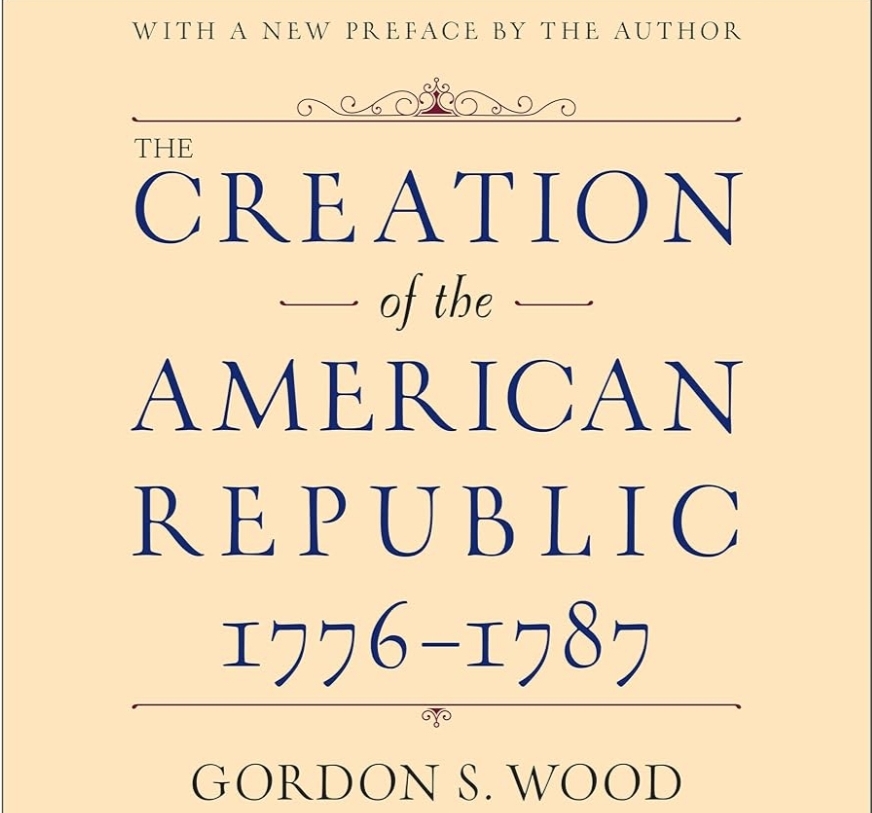Gordon S. Wood’s The Creation of the American Republic, 1776-1787 is a seminal work that explores the intellectual and political transformations that occurred in the United States between the American Revolution and the drafting of the U.S. Constitution. This book is a deep investigation into the ideological foundations of the early American republic, tracing how the revolutionary generation sought to create a new political system and grappled with the challenges of building a republic from scratch.
Key Themes and Concepts:
Transformation of Political Thought: Wood explores how the American Revolution sparked a profound change in the way Americans thought about politics, government, and sovereignty. He argues that the Revolution was not just a war for independence, but also an ideological shift that redefined the nature of government and the relationship between rulers and the ruled.
Republicanism and Its Challenges: The book focuses heavily on the rise of republicanism as the dominant political ideology during this period. Wood explains how early Americans were deeply influenced by classical republican ideals, which emphasized civic virtue, the common good, and a fear of corruption. However, he also illustrates the inherent tensions within republicanism, such as the challenge of balancing liberty with authority, and how these tensions played out in the creation of the new government.
The Articles of Confederation: Wood provides a detailed analysis of the Articles of Confederation, the United States’ first governing document, and its failure to provide a strong and effective national government. He explains how the weaknesses of the Confederation—such as the lack of centralized authority, ineffective national taxation, and the inability to regulate interstate commerce—led to widespread dissatisfaction and paved the way for the Constitutional Convention.
The Constitutional Debate: A key focus of the book is the debate over the drafting and ratification of the U.S. Constitution. Wood discusses how the framers of the Constitution, particularly James Madison and Alexander Hamilton, sought to address the failures of the Articles of Confederation by creating a stronger national government while still preserving the principles of republicanism. He delves into the Federalist and Anti-Federalist arguments, showing the ideological divide over the proper scope of government and the fear of centralized power.
The Role of Popular Sovereignty: Wood highlights the emergence of popular sovereignty as a foundational principle of the American political system. The idea that ultimate authority rested with the people, rather than a monarch or elite ruling class, was revolutionary and formed the basis for the new republic’s legitimacy. However, the book also explores the complexities of translating popular sovereignty into a functional system of government, particularly in terms of representation and federalism.
Evolution of Political Institutions: The book provides a detailed account of how early American political institutions—such as state constitutions, the Continental Congress, and eventually the federal Constitution—were created and evolved. Wood examines how these institutions were shaped by republican ideals, but also by practical concerns about governance, economic stability, and foreign relations.
The Role of Virtue and Corruption: Wood argues that early Americans believed that virtue—the selfless dedication to the common good—was essential for a republic to survive. They feared that corruption—the pursuit of personal interest at the expense of the public good—would lead to the downfall of their new government, as it had with previous republics in history. This concern shaped their debates over the design of political institutions and the distribution of power.
The Shift Toward a Stronger Central Government: As the weaknesses of the Articles of Confederation became apparent, many leaders began to advocate for a stronger central government. Wood details the ideological shift that occurred between 1776 and 1787, where initially radical ideas about decentralization and state sovereignty gave way to the need for a more robust federal system, culminating in the drafting of the U.S. Constitution.
Structure of the Book:
Introduction: Wood introduces the central argument of the book—that the American Revolution led to a fundamental transformation in political thought and the creation of a new form of republican government.
Early Political Thought: The first part of the book focuses on the intellectual origins of the American Revolution, examining the influence of classical republicanism and Enlightenment ideas on the revolutionary generation.
Articles of Confederation: Wood discusses the creation and shortcomings of the Articles of Confederation, explaining how they reflected the revolutionaries’ fear of centralized power but ultimately proved unworkable.
Constitutional Debates: The book’s core chapters focus on the Constitutional Convention and the debates over the creation of a stronger national government. Wood delves into the Federalist and Anti-Federalist arguments and the compromises that shaped the final document.
Popular Sovereignty and Republicanism: Wood explores how the framers sought to reconcile the ideals of popular sovereignty and republicanism with the need for effective governance.
Conclusion: The final chapters reflect on how the Constitution marked a shift toward a more pragmatic approach to governance, balancing ideals of liberty with the need for a stable and functioning government.
Significance:
The Creation of the American Republic is widely regarded as one of the most important works in American political history. It won the Bancroft Prize in 1970 and remains a foundational text for understanding the ideological and political transformations of the Revolutionary era. Wood’s analysis of the intellectual and political foundations of the American republic provides crucial insights into the creation of the Constitution and the enduring debates over the nature of American democracy.
Conclusion:
Gordon S. Wood’s The Creation of the American Republic, 1776-1787 offers a comprehensive and nuanced examination of the political and intellectual developments that shaped the founding of the United States. By focusing on the evolution of republicanism and the challenges of creating a new political system, Wood provides a deep understanding of the complexities and debates that influenced the drafting of the U.S. Constitution. For anyone interested in the origins of American political thought and the creation of the U.S. government, this book is an essential resource.







